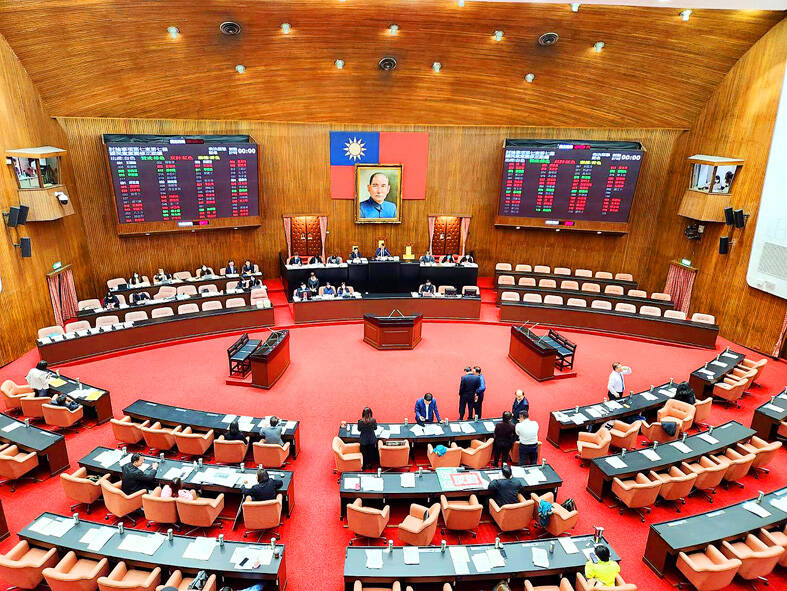The Legislative Yuan yesterday passed the Minimum Wage Act (最低工資法), which stipulates mechanisms to review the minimum wage annually and penalize employers who pay workers below the minimum pay stated in labor agreements.
The act, a pledge that President Tsai Ing-wen (蔡英文) made during her 2016 presidential campaign, was first approved on Oct. 8 by the legislature’s Social Welfare and Environmental Hygiene Committee.
Lawmakers were scheduled to vote on four articles up for dispute in yesterday’s plenary session, including a motion proposed by the New Power Party that would ban employers who contravene the act from participating in government procurement projects.

Photo: CNA
However, with its absolute majority, the Democratic Progressive Party (DPP) rejected all motions proposed by opposition parties.
The act was passed on the third reading based on motions proposed by DPP legislators.
The act requires the Ministry of Labor to establish a minimum wage review committee, which would convene every year in the third quarter to discuss whether the minimum wage should be adjusted.

Photo: Hsieh Chun-lin, Taipei Times
Any adjustments should take changes in the consumer price index into account, the act says.
Wages that workers and employers agree on must not be below the government-stipulated minimum wage, and employers can be fined up to NT$1.5 million (US$47,605) for contravening the act.
The Taiwan Labor Front applauded efforts by lawmakers across party lines to set aside their ideological differences and pass the bill in the year’s last plenary session.
“Many have questioned the necessity of having a minimum wage act, given that the minimum wage has increased for eight straight years. However, deliberations over the minimum wage adjustment often proceeded in a chaotic manner, which magnified the importance and urgency of legislating the minimum wage,” the labor rights group said in a statement.
The annual adjustment of the minimum wage has made society more aware of the importance of raising wages, the group said.
“We hope that the act will effectively raise the salaries of entry-level workers, as a reasonable, transparent and stable minimum wage adjustment mechanism is developed,” it said.
“The labor ministry would first have a research team study factors affecting the minimum wage, which would make recommendations to the minimum wage review committee. The committee would then make a final decision on whether the minimum wage should be adjusted,” it said.
“Global supply chain disruptions present both challenges and opportunities, and the fundamental solutions to the labor shortage problem are to continue raising workers’ salaries and improving work conditions,” the labor rights group said, adding that it would propose bills to demand salary transparency.
The Chinese National Association of Industry and Commerce, Taiwan affirmed the passage of the much-anticipated act, saying it provides a legal basis for adjusting the minimum wage.
Through the act, the mechanism to review the minimum wage can function in a regular and transparent manner, it said.
“We hope that the Ministry of Labor’s research team can include representatives from industrial and commercial sectors and their input. This would contribute to more focused, just and convincing discussions at the minimum wage review committee,” the association said.
Regarding slow wage growth, the association said that it is a structural issue that needs to be addressed by both industry and government, adding that raising the minimum wage is only part of the solution.
“In the long run, there needs to be an adjustment of the industrial structure to enhance industrial competitiveness and raise workers’ productivity, which would simultaneously boost growth in corporate profits and wages,” the association said.

CALL FOR SUPPORT: President William Lai called on lawmakers across party lines to ensure the livelihood of Taiwanese and that national security is protected President William Lai (賴清德) yesterday called for bipartisan support for Taiwan’s investment in self-defense capabilities at the christening and launch of two coast guard vessels at CSBC Corp, Taiwan’s (台灣國際造船) shipyard in Kaohsiung. The Taipei (台北) is the fourth and final ship of the Chiayi-class offshore patrol vessels, and the Siraya (西拉雅) is the Coast Guard Administration’s (CGA) first-ever ocean patrol vessel, the government said. The Taipei is the fourth and final ship of the Chiayi-class offshore patrol vessels with a displacement of about 4,000 tonnes, Lai said. This ship class was ordered as a result of former president Tsai Ing-wen’s (蔡英文) 2018

UKRAINE, NVIDIA: The US leader said the subject of Russia’s war had come up ‘very strongly,’ while Jenson Huang was hoping that the conversation was good Chinese President Xi Jinping (習近平) and US President Donald Trump had differing takes following their meeting in Busan, South Korea, yesterday. Xi said that the two sides should complete follow-up work as soon as possible to deliver tangible results that would provide “peace of mind” to China, the US and the rest of the world, while Trump hailed the “great success” of the talks. The two discussed trade, including a deal to reduce tariffs slapped on China for its role in the fentanyl trade, as well as cooperation in ending the war in Ukraine, among other issues, but they did not mention

HOTEL HIRING: An official said that hoteliers could begin hiring migrant workers next year, but must adhere to a rule requiring a NT$2,000 salary hike for Taiwanese The government is to allow the hospitality industry to recruit mid-level migrant workers for housekeeping and three other lines of work after the Executive Yuan yesterday approved a proposal by the Ministry of Labor. A shortage of workers at hotels and accommodation facilities was discussed at a meeting of the legislature’s Transportation Committee. A 2023 survey conducted by the Tourism Administration found that Taiwan’s lodging industry was short of about 6,600 housekeeping and cleaning workers, the agency said in a report to the committee. The shortage of workers in the industry is being studied, the report said. Hotel and Lodging Division Deputy Director Cheng

TOKYO SUMMIT: The new Japanese PM’s words have demonstrated Japan’s ‘firm position on urging the prioritization of cross-strait peace,’ the foreign ministry said Minister of Foreign Affairs Lin Chia-lung (林佳龍) yesterday thanked US President Donald Trump and Japanese Prime Minister Sanae Takaichi for supporting peace in the Taiwan Strait, a day after the two at a summit in Tokyo emphasized the importance of regional stability and ahead of a meeting between Trump and Chinese President Xi Jinping (習近平) in South Korea today. The previous day’s meeting was the first time Takaichi had met with the US leader since becoming Japanese prime minister, the Ministry of Foreign Affairs said in a statement. Since taking office on Tuesday last week, Takaichi has urged the international community to